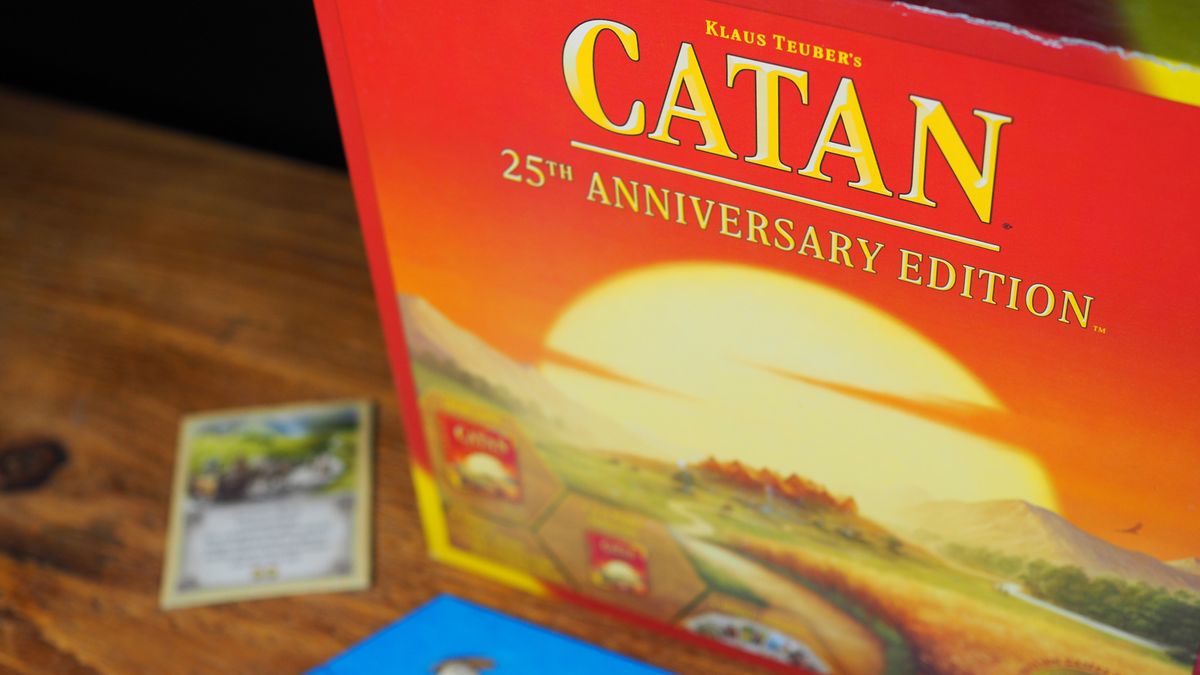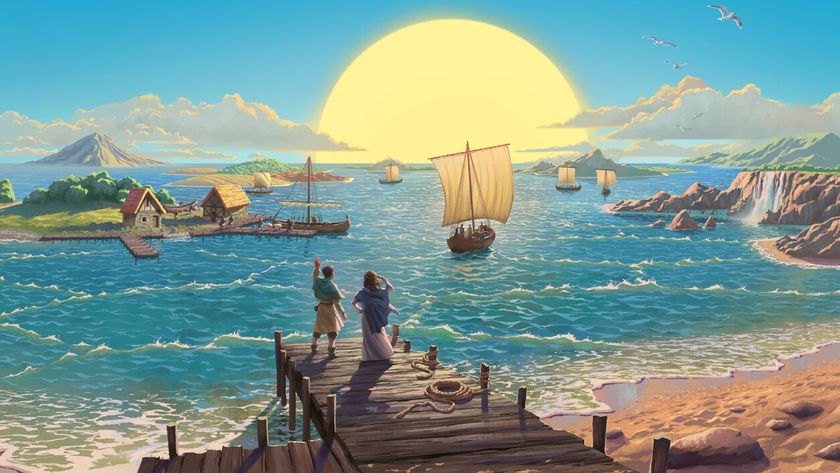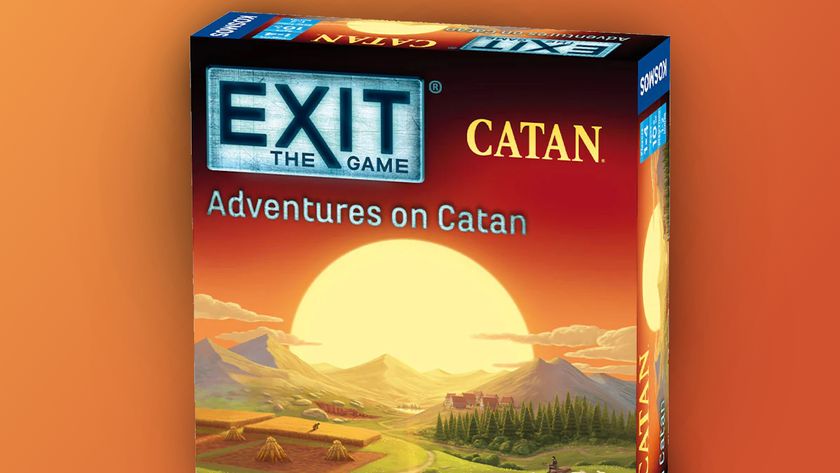12DOVE Verdict
While Catan has its flaws and might seem rudimentary today, it's heavily expandable, replayable, accessible, and affords plenty of playstyles. It manages to deftly negate a lot of would-be issues and while it's got its flaws, it's hard to imagine the board gaming landscape without it.
Pros
- +
An incredible legacy
- +
Accessible and easy to learn
- +
Affords various playstyles
- +
Indefinitely expandable
- +
Encourages social play
Cons
- -
Might feel rudimentary in today's landscape
- -
Direct conflict can cause arguments
- -
Players can get stuck
Why you can trust 12DOVE
Checking out the legendary game of Catan in 2024 is like being presented with the blueprint for the wheel. It's a hex-based strategy game with resource management and area control mechanics, and playing today is a dive into the rudimentary world of abstract economics. Players take the role of settlers looking to start a new life in the uninhabited land of Catan, building, trading and stealing their way to victory. The goal is to gain ten Victory Points before your opponents.
Simple, right? Catan is so essential to the evolution of the best board games that it's basically archetypal. It may be easy to take Catan's simplistic mechanics for granted when you've been knee deep in games like Scythe and Gloomhaven for years but, at the time, its mechanisms were pioneering. Appropriate then that Catan is a game inspired by Viking pioneers – hence its previous name "The Settlers of Catan."
The question is, how does Catan stack up against the rest of the board game market today?
Features & design
| Price | $59.99 / £49.99 |
| Ages | 10+ |
| Game type | Eurogame |
| Players | 3 - 4 (expandable) |
| Lasts | 60 - 120mins |
| Complexity | Moderate |
| Designers | Klaus Teuber |
| Publisher | Catan GmbH |
| Play if you enjoy | Ticket to Ride, Carcassonne, Scythe, Terraforming Mars |
- Settle an uninhabited island
- Gather resources and trade
- Earn the most points to win
In Catan, you play as settlers trying to build a community of their own on the eponymous island of the same name. The trouble is, there's limited space and resources... so you'll need to hustle.
The oldest player is meant to take the first turn, though it's more commonly ruled that the highest roll starts. Whoever takes the lead places their first Settlement and Road on the board, and then, through a snake draft mechanic, the turn order shifts from clockwise to anticlockwise until everyone has placed two of each. Starting resources are distributed at this point, depending on which hexes each player's Settlements border.
On their turn, a player rolls two six-sided dice to check which hexes produce resources that round. Players take one resource per owned Settlement that borders matching hexes, or two of that resource per City. These resources can then be traded, either between players or via Maritime Trade, and used to build with. Building outwardly from your initial Settlements, players spend combinations of resources to build as many Roads and Settlements as they want, or to upgrade their Settlements to Cities for resource bonuses. Each City gains a player two Victory Points, while a Settlement only counts as one. It's a simple, elegant system.
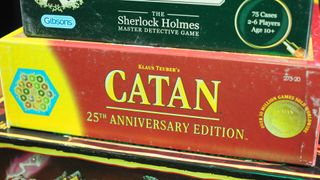
Resources can also be spent on Development Cards, which have the potential to turn your settlers' fortunes. Perhaps you'll come across a Knight or three with which to assert the Largest Army (and two Victory Points). You might find a Progress card that allows you to steal every card of a declared resource from other players' hands. Some cards just straight up hand you Victory Points, no questions asked.
As an added wrinkle, the Robber comes into play when any player rolls a seven or plays a Knight card. At which point that player must block all production on a Hex of their choice by moving the Robber there.
So far as those board tiles go, Catan opts for a realistic, birds-eye-view look that's rather handsome when laid out on the table. Meanwhile, the game's tokens may seem workmanlike now (they're blocks or basic house shapes made from wood), but they set the standard for years to come. This is the kind of design that doesn't age in the way miniatures often do.
Gameplay
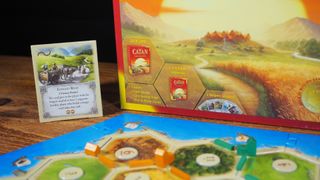
- Easy to understand, but has depth
- Very well balanced
- Take-that actions could cause tension
Despite Catan being easy to understand and explain to new players, it's still a game of varied tactics. We're not talking Campaign for North Africa levels of complexity, but more mentally taxing than a game of tic-tac-toe. Working with small numbers and a simplified ruleset makes the game more accessible, and signifying the odds helps demystify tactics for new players, though it can feel boring to modern enthusiasts. Hitting this middling complexity weight is part of what gives Catan such a wide appeal, however, and the game encourages asymmetric play styles that make it all the more approachable.
Heaps of hex and number combinations give Catan so much replayability. It's also extremely easy to mod and there are expansions to suit everyone. Some rehash old rules, or add in new mechanics that give a familiar game an exciting twist.
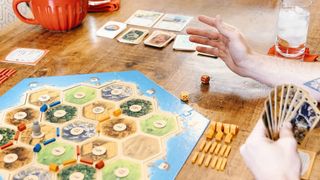
If you get tired of the original game, there are plenty of expansion packs that alter or build on its mechanics:
Seafarers | Check Amazon
Cities & Knights | Check Amazon
Traders & Barbarians | Amazon
Explorers & Pirates | Amazon
Catan feels well balanced. Although there are a couple of minor snags, it deftly evens the battlefield between new and experienced players with fair procedurality. The snake draft mechanic for the first couple of rounds helps to negate the first player advantage. However, even though there's no player elimination mechanic, players can get blocked in a corner pretty early. It means that while you're not entirely excluding players, the majority of the game can feel futile if they get stuck.
Catan is a game of direct conflict, and take-that actions can cause tensions to run high. From blocking each other's resource production with the robber, to stealing peoples entire hand of cards, it can get pretty rough, making negotiating trade a little difficult. Luckily, you're not limited to trading with each other, which is just one of many ways Catan rectifies its potential downfalls.
Should you buy Catan?
| Gameplay | Catan's mechanics were revolutionary in their straightforward yet layered approach that rewards you for skill, not luck. They still hold up today. | 5/5 |
| Accessibility | It isn't as simple as Clue or Risk, but Catan is still very easy to get into. It's a great gateway game. | 4/5 |
| Replayability | Because of the randomized board and varied starting positions, you can keep coming back to Catan and get a different experience. | 5/5 |
| Setup and pack-down | While fitting together the board pieces can be a headache, it's pretty straightforward on the whole. | 4/5 |
| Component quality | It's simple by today's standards, sure. But there's a classiness to Catan's wooden tokens and chunky board tiles. | 4/5 |
Against today's board game market, going back to Catan is like trying to play Morrowind for the first time when you're used to RPGs such as Baldur's Gate 3. That doesn't mean it's bad, just simplistic against the current landscape. It's still worth a go if even just to get a feel for how far the genre has come.
Buy it if...
✅ You're unsure if economics games / board gaming is your thing
Catan is super approachable whatever your stance on board gaming, and affords a range of play styles for those used to more offensive or defensive games.
✅ You want to appreciate the legacy of the Eurogame
Catan was one game that helped the Eurogame spread across the world, and for that you owe it your thanks. For a collector, it's an essential addition to your wall of games.
Don't buy it if...
❌ Your table is the type to argue
Catan forces direct conflict between players, so it's easy for rivalries to ensue. If your players are likely to argue, there are plenty of opportunities to do so playing Catan.
❌ You're used to playing more complex games
The lack of modern twists on mechanics might bore your average hardcore board gamer today. It's easy to learn and teach, but it might leave aficionados wanting more.
How we tested Catan
Disclaimer
This review was conducted with a sample provided by the publisher.
I spent over a week testing Catan for review, but have been playing the game for a long time before that. I paid particular attention to how it stacks up against the competition today, and how its mechanics have aged since publication in 1995.
For a more thorough look at our process, see this guide to how we test board games, or the wider 12DOVE reviews policy.

Katie is a freelance writer with almost 5 years experience in covering everything from tabletop RPGs, to video games and tech. Besides earning a Game Art and Design degree up to Masters level, she is a designer of board games, board game workshop facilitator, and an avid TTRPG Games Master - not to mention a former Hardware Writer over at PC Gamer.
- Benjamin AbbottTabletop & Merch Editor
